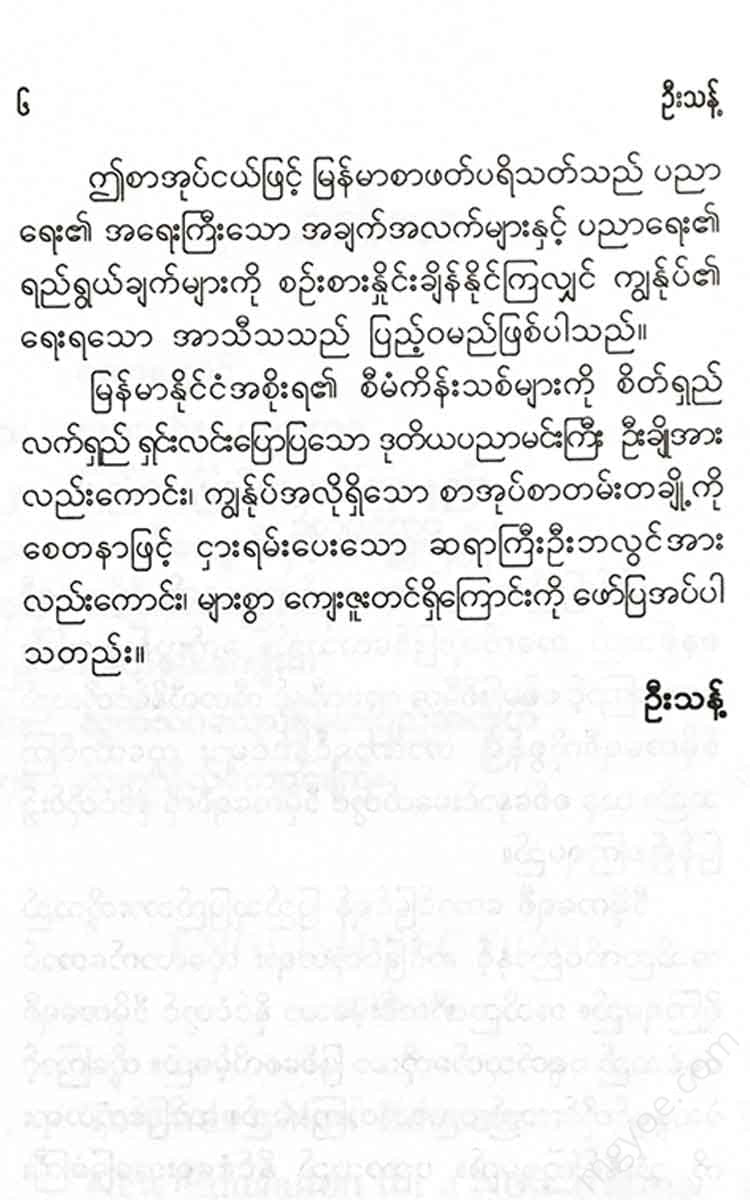Other Websites
U Thant - New Burma and New Knowledge
U Thant - New Burma and New Knowledge
Couldn't load pickup availability
The Second World War was a war that destroyed not only political and economic ideologies, but also educational ideologies.
Just as in politics the flaws of imperialism and narrow nationalism were made more apparent than ever before, in economics the flaws of capitalism and unplanned policies were made more apparent.
Similarly, in education, people are increasingly realizing the ideology that the education of their citizens is the responsibility of the government, just like the health and employment of their citizens.
World scholars such as H.G. Wells, Mahatma Gandhi, and Linton have written that a country's independence, economy, and industrial development depend solely on education, and that in this post-war era, the creation of new knowledge should be considered the main task of every government in every country.
Immediately after the war in Russia, the compulsory education system was extended from ten years to eleven years, with one year added.
In England, the new Butler Act, passed on April 1, 1945, made not only primary education but also secondary education almost entirely the responsibility of the government.
Thousands of schools in India have been rapidly experimenting with the Vada education system pioneered by Mahatma Gandhi and other educational leaders.
It is known that the education system currently managed by the government's Department of Education in Myanmar is a new education system created to suit the times.
Although it is not possible to fully describe the new education of each country in this booklet, we will briefly describe and criticize the new education plan for Myanmar based on their basic concepts.
The independent Myanmar Education Department during the Japanese era defined the purpose of education as follows.
(1) For livelihood
(2) To be polite
(3) To improve relationships
These three objectives are completely consistent with the educational objectives of civilized countries. Sir Richard Livingstone, an English scholar, defined the objectives of education in the same way.
Everyone should understand that education is for the sake of their own family. Schools should guide them so that they can happily travel the world, whether they are making a living with their own brains or their own hands.
A person who does not know how to do any job after leaving school, who does not know how to do his job well, is a failure. Therefore, it is said that one of the purposes of education should be for career. Therefore, it is agreed that many career subjects should be included in the school curriculum.
The second purpose, “to be civilized,” must be clarified. What is civilized in terms of teaching students to be civilized? Would a Burmese act that is considered civilized be civilized in the eyes of a Westerner? In Western schools and in Japanese schools during the war, children were taught singing, dancing, and music. Traditional Burmese would not agree with traditional Burmese that the art of acting, which is condemned as a form of entertainment that is not to be shared with others, is a civilized art. However, it should be noted that the new art that will be described here is not the old art.
In creating a new Burma, we cannot rely solely on old knowledge. We must be able to suck the milk of knowledge from countries that are very new, very advanced, and advanced. Myanmar needs cultured citizens. It is difficult to explain the word “cultured” in a simple way, but it is not very difficult to show it in action. In our time, people like Leti Sayadaw, U Ottama, the dramatist U Phoe Sein, the painter U Ba Nyan, and the poet U Ba Cho were all cultured Burmese.
Therefore, one of the goals of new education for creating a new Burma is to create civilized citizens.
The third purpose, which is to have good relationships, also needs to be clarified. In other words, it is the aim to become good citizens. What kind of people are called good citizens?
In short, a person who has good character, a lot of knowledge, good health, a willingness to work not only for himself but also for others, and compassion is a good citizen.
In this post-war era, another quality has been added. It is that war is very terrible, it is the most severe of the three great disasters, and everyone must try to prevent another war. Only by fully understanding the great suffering of war can every citizen be a good citizen. Therefore, in line with this aim, in England and America, there are already calls to completely eliminate the “war spirit” from schools and to teach the importance of “love” in depth.
Therefore, I would say that the above three objectives of education are very relevant objectives.
2. Our country and their country
The government has appointed several committees of inquiry in the past to thoroughly investigate and reform education in Burma. The latest, most important, and most comprehensive report was issued in 1936. It is called the Campbell Report by the country, after the name of the committee's chairman, Mr. Campbell (now a Sr.), and should be read by all who are interested in education.
A very strange thing about this report is that it was praised by Indian newspapers and magazines, but harshly criticized by Myanmar newspapers and journals, the Myanmar Teachers' Union, the National Education Federation, and the University of Yangon.
Among the criticisms from various groups in Myanmar, the University of Yangon's criticisms generally indicate that they prefer the existing education system in Myanmar over Campbell's. The National Education Federation, however, says that Campbell's report does not meet the educational standards the country is aiming for.
I have read the Campbell Report and its criticisms, the Haddow Reports cited by the Campbell Committee, and the Calcutta University Inquiry.











